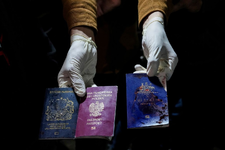The US finally allowed an anti-Israel resolution to pass in the UN.
They are now claiming that the resolution doesn't say what it says, and that Israel doesn't have to follow the law.
You see, when the bad guys run the sherriff's office, the laws are just "Suggestions" for some, and the law for others.
It's the Rule of Law vs the American "Rules Based Order" we've been hearing so much about.
All UN Security Council resolutions are legally binding and have the status of international law.
There is no debate amongst international law scholars that resolutions by the UN Security Council that "demand" certain actions are binding (good explanation by a legal scholar here). In fact resolutions by the council ARE international law, article 25 of the UN Charter clearly states: "The Members of the United Nations agree to accept and carry out the decisions of the Security Council in accordance with the present Charter."
Yet the US now argues that the "rule" is in fact different: "It's a non-binding resolution, so there's no impact at all on Israel".
The US created the United Nations, and the concept of international law is well established, with 80 years of precedent. The US is rapidly approaching the point where it is no longer the world hegemon. The repurcussions from the international community when the US cannot simply threatened to kill or destroy those who disagree with it are going to be brutal.
They are now claiming that the resolution doesn't say what it says, and that Israel doesn't have to follow the law.
You see, when the bad guys run the sherriff's office, the laws are just "Suggestions" for some, and the law for others.
It's the Rule of Law vs the American "Rules Based Order" we've been hearing so much about.
All UN Security Council resolutions are legally binding and have the status of international law.
On March 25, the U.S. went one step further and took a step toward becoming a rogue state who has supplanted international law with its rules-based order. International law is grounded in the charter system and the United Nations and is universally applicable. The rules-based order is composed of unwritten laws whose source, consent, and legitimacy are unknown. To the global majority, those unwritten laws have the appearance of being invoked when they benefit the U.S. and its partners and not being invoked when they don’t.
On March 25, the Security Council passed a resolution demanding “an immediate ceasefire for the month of Ramadan respected by all parties leading to a lasting sustainable ceasefire.” The resolution was able to pass because the U.S. stood aside and let the other fourteen Security Council members pass it by abstaining instead of vetoing.
But in her explanation of the American abstention after the resolution passed, U.S. Ambassador to the UN Linda Thomas-Greenfield “surprisingly” said that “we fully support some of the critical objectives in this nonbinding resolution.”
Her claim that the Security Council resolution was nonbinding was not an off script, impromptu comment. It is the strategy of a country that enforces, not international law, but the U.S. led rules-based order.
There is no debate amongst international law scholars that resolutions by the UN Security Council that "demand" certain actions are binding (good explanation by a legal scholar here). In fact resolutions by the council ARE international law, article 25 of the UN Charter clearly states: "The Members of the United Nations agree to accept and carry out the decisions of the Security Council in accordance with the present Charter."
Yet the US now argues that the "rule" is in fact different: "It's a non-binding resolution, so there's no impact at all on Israel".
that's the beauty of the rules-based order: the rules are made-up in the moment to fit the interests of the U.S. and its henchmen, depending on the circumstances.
The big issue here is that the whole world, literally, disagrees with the U.S. claims.
Four of the five permanent members of the UN Security Council - including two major U.S. allies -, all of its non-permanent members and the UN Secretary General have explicitly said that UNSC Res 2728 is binding.
The U.S. (plus maybe a few of its minor proxies) is the only state which publicly disputes that.
Bertrand points out that this will have huge consequences:
The US created the United Nations, and the concept of international law is well established, with 80 years of precedent. The US is rapidly approaching the point where it is no longer the world hegemon. The repurcussions from the international community when the US cannot simply threatened to kill or destroy those who disagree with it are going to be brutal.




